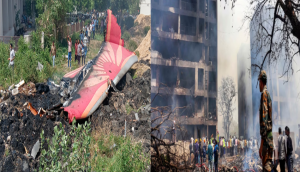
Taliban has after over two decades again seized control of Afghanistan's capital Kabul. This time, however, they have pledged to protect the rights of women and minorities and assured that the Islamic Emirate of Afghanistan would not pose a threat to any country.
Political experts say that it might not be as plain as that and doubt whether the terror group which is yet to moderate its "draconian views" on justice will stand by what its promises.
The Taliban had ruled Afghanistan from 1996 until 2001 and in those five years they imposed Sharia Islamic law in the country, introducing punishments in line with their strict interpretation of the law - publically executing convicted murderers and adulterers and carrying out amputations of those found guilty of theft. Men were required to grow beards and women had to wear the all-covering hijab.
In his book 'Taliban' (2000), Pakistani journalist Ahmed Rashid says the terror group also banned television music and cinema and disapproved of girls aged 10 and over going to school. They were accused of various human rights and cultural abuses.
The outfit was thrown out of power by US forces following the 9/11 terror attacks and since then the Taliban had been gradually regrouping across the border in Pakistan and has led an insurgency against the US-backed government in Kabul for nearly 20 years.
In the Doha agreement, in which the US agreed to drawback their forces in exchange for a Taliban pledge to prevent al-Qaeda in return for a Taliban pledge to prevent al-Qaeda from operating in areas under Taliban control.
This Sunday the Taliban finally took over control of Afghanistan's capital of Kabul after months of violence across the war-ravaged country.
Video footage over the past few days showed chaotic scenes at the Kabul airport where desperate Afghans jostled to get on to planes exiting the country in an attempt to flee the country. This was a reflection of the intense panic shrouding Afghanistan with people fearing the return of the brutal Taliban regime, which ruled the country in the late nineties.
The international community watched with equal trepidation the unfolding events.
In the first presser in the capital city after the siege of Afghanistan on Tuesday , Taliban spokesperson Zabihullah Mujahid said that "soon they will reach a settlement through which an Islamic government will be established in the country."
Responding to a question about differences between now and the 1990s, Taliban spokesperson said "the ideology and beliefs are the same because they're Muslims, but there is a change in terms of experience--they're more experienced and have a different perspective."
Only time will tell how the Taliban intend to run the country. However, experts are doubtful that the terror group will stand by its promise.
US scholar Michael Kugelman said the Taliban has gone into overdrive in its efforts to assure Afghans and the world that's there's nothing to fear about today's Taliban but its track record tells otherwise.
"It has never renounced violence, it has not moderated its draconian views on justice and women, and it is allied with international terrorists," he added.
Mohammed Soliman, Scholar at the Middle East Institute in Washington, also believe that the social and civil rights "arena is foggier".
There were also signs that the ground situation does not match Taliban's promises.
The United Nations secretary-general, Antonio Guterres, said on Monday that his organization was "receiving chilling reports of severe restrictions on human rights" throughout the country. "I am particularly concerned by accounts of mounting human rights violations against the women and girls of Afghanistan," he said at an emergency meeting of the Security Council.
The Afghan government's collapse has left the Taliban in control of not only security but also basic services in a country already facing a drought that has left a third of its 38 million people in danger of running out of food.
On Monday, hundreds of people poured onto the tarmac at Kabul's international airport, desperately seeking a route out of Afghanistan. Some were seen hanging to the sides of military aircraft with their bare hands. This comes as the US is withdrawing its remaining troops from the war-ravaged country.
Terming the images from Kabul as "horrifying and crystallize", Kugelman, the Deputy Director of the Asia Program and Senior Associate for South Asia at the Wilson Center, said the has the US botched the "execution of the withdrawal in a catastrophic way".
"The images from Kabul are horrifying and crystallize just how much the US has failed in Afghanistan. It's perfectly understandable to withdraw, but this needs to be executed in a way that doesn't fail the Afghan people. And the US botched the execution of the withdrawal in a catastrophic way," he said.
The same was echoed by Soliman, who said the way withdrawal was conducted will cast a shadow over Washington's advocacy for human rights and value-based liberal order.
However, the way the withdrawal was conducted and how Afghan allies were treated, will cast a shadow over Washington's advocacy for human rights and value-based liberal order.
"The U.S, allies around the world expected and accepted Washington's effort to end its twenty-year-long war in Afghanistan and focus its limited resources on the Indo-Pacific theater. However, the way the withdrawal was conducted and how Afghan allies were treated, will cast a shadow over Washington's advocacy for human rights and value-based liberal order," Soliman added.
(ANI)
Also Read: S Jaishankar, Estonia counterpart exchange views on Afghan crisis







![BJP's Kapil Mishra recreates Shankar Mahadevan’s ‘Breathless’ song to highlight Delhi pollution [WATCH] BJP's Kapil Mishra recreates Shankar Mahadevan’s ‘Breathless’ song to highlight Delhi pollution [WATCH]](https://images.catchnews.com/upload/2022/11/03/kapil-mishra_240884_300x172.png)

![Anupam Kher shares pictures of his toned body on 67th birthday [MUST SEE] Anupam Kher shares pictures of his toned body on 67th birthday [MUST SEE]](https://images.catchnews.com/upload/2022/03/07/Anupam_kher_231145_300x172.jpg)






